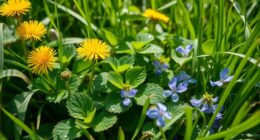Herbalism, while popular as a complementary healthcare approach, poses significant risks to consumer safety and quality. Adverse reactions, allergic reactions, and potential drug interactions can occur, exacerbated by lack of standardized guidelines and quality control measures. Inconsistent product quality, contamination, and adulteration further compromise safety. Environmental degradation, financial burdens on patients, and misleading marketing practices also plague the industry. Additionally, nearly 80% of practitioners lack formal education and training, leading to misdiagnosis and ineffective treatment. Integrating herbal remedies with conventional medicine is challenging due to lack of standardized regulations and education. As concerns mount, it's clear that a closer examination of the industry is warranted to uncover the full scope of these challenges.
Key Takeaways
• Adverse reactions to herbal supplements can be unpredictable and severe, with allergic reactions and drug interactions posing significant health risks.
• Lack of quality control measures and inconsistent product quality expose consumers to contaminants, adulterants, and variable potency.
• Unsustainable harvesting practices and environmental degradation threaten the long-term availability of medicinal plants and contribute to ecological imbalance.
• Misdiagnosis and ineffective treatment risks arise from the lack of formal education and training among herbalism practitioners and the absence of standardized educational pathways.
• Exaggerated claims and misleading marketing practices hinder integration with conventional medicine and create challenges for healthcare professionals seeking to incorporate herbal remedies into treatment plans.
Health Risks and Safety Concerns
When consuming herbal remedies, individuals unknowingly expose themselves to a multitude of health risks and safety concerns, including adverse reactions and allergies, potential drug interactions, and dosage concerns that can have devastating consequences.
Adverse reactions can range from mild to life-threatening, and allergic reactions can be unpredictable. In addition, herbal remedies can interact with prescription medications, leading to adverse reactions or reduced efficacy.
Additionally, dosage concerns arise from the lack of standardized guidelines, making it challenging to determine an accurate dose. Misdiagnosis and delayed treatment risks are also prevalent, as individuals may mistake herbal remedies for conventional treatments.
According to the National Institutes of Health, "the lack of standardization in the herbal industry can lead to inconsistent quality and potential health risks."
Quality Control and Regulation Gaps

Moreover, the absence of rigorous quality control measures in the herbal industry leads to inconsistent product quality, exposing consumers to potential health risks from contaminants, adulterants, and variable potency. This lack of regulation results in products that may not contain the listed ingredients, or may contain harmful substances.
Moreover, the variability in potency and composition of herbal products makes it challenging for consumers to make informed decisions.
Inconsistent labeling and dosing information hinder safe and effective use.
Regulatory gaps and less rigorous standards allow subpar products to flood the market.
Quality control challenges and contaminants pose significant health risks to consumers.
Environmental and Financial Implications

Over 75% of medicinal plants are still sourced from the wild, leading to unsustainable harvesting practices that contribute to environmental degradation and ecological imbalance. This not only harms the environment but also threatens the long-term availability of these plants. The financial implications are also significant, with the accumulated costs of herbal remedies, especially for chronic conditions, placing a substantial burden on patients. Insurance plans often do not cover alternative therapies, leaving patients to bear the costs themselves.
| Environmental Impacts | Financial Impacts | Potential Solutions |
|---|---|---|
| Unsustainable harvesting | Accumulated costs for chronic conditions | Sustainable harvesting practices |
| Ecological imbalance | Financial burden on patients | Certification programs for sustainable sourcing |
| Loss of biodiversity | Limited insurance coverage | Education on environmental impacts |
Professional Guidance and Education

Furthermore, nearly 80% of herbalism practitioners lack formal education and training, leaving consumers to navigate the complex world of herbal remedies without reliable guidance.
This lack of professional guidance is concerning, as it can lead to misdiagnosis and ineffective treatment. Additionally, the absence of standardized educational pathways in herbalism hinders the development of knowledgeable practitioners.
Limited access to well-trained practitioners forces consumers to rely on self-diagnosis and self-treatment, which can be risky.
The growing interest in herbalism isn't matched by the availability of trained professionals, exacerbating the guidance gap.
Challenges in providing reliable guidance for herbal treatments hinder the integration of herbalism into mainstream healthcare.
Misleading Marketing and Integration Challenges

Exaggerated claims and misleading marketing practices pervade the herbalism industry, making it challenging for consumers to discern fact from fiction. Manufacturers often prioritize profits over transparency, touting unsubstantiated benefits and downplaying potential risks. This lack of transparency creates confusion among consumers, who may unknowingly combine herbal supplements with prescription medications, risking adverse interactions.
According to a study published in the Journal of Clinical Pharmacology, 'the concurrent use of herbal supplements and prescription medications can lead to decreased efficacy or increased toxicity of conventional medications.' As a result, healthcare professionals face significant challenges integrating herbal remedies with conventional medicine, further highlighting the need for standardized regulations and education in the herbalism industry.
Frequently Asked Questions
Can Herbal Remedies Be Used in Conjunction With Chemotherapy?
While herbal remedies may seem like a natural complement to chemotherapy, they can interact with medications, reduce their efficacy, or exacerbate side effects.
According to the National Cancer Institute, 'some herbal supplements can interfere with chemotherapy or radiation therapy, making them less effective.'
It's crucial for patients to consult their oncologist before using herbal remedies in conjunction with chemotherapy to guarantee safe and effective treatment.
How Do I Choose a Reputable Herbalist or Practitioner?
When seeking a reputable herbalist or practitioner, it's important to do your due diligence. Look for credentials from a reputable institution, such as a degree in herbalism or a certification from a recognized organization like the National Certification Commission for Acupuncture and Oriental Medicine (NCCAOM).
Check for online reviews, ask for referrals, and make sure they've experience treating conditions similar to yours. As Dr. Tieraona Low Dog, a renowned herbalist, advises, 'Find someone who's knowledgeable about the herb-drug interactions and can work with your healthcare provider.'
What Are the Best Resources for Reliable Herbalism Information?
She recommends consulting reputable sources like the National Institutes of Health's (NIH) National Center for Complementary and Integrative Health (NCCIH) and the National Institute of Environmental Health Sciences (NIEHS) for reliable herbalism information.
Additionally, peer-reviewed journals such as the Journal of Ethnopharmacology and Phytomedicine provide scientifically-backed data on herbal remedies.
These trusted resources help consumers make informed decisions about their health and wellness.
Can Herbal Supplements Be Used to Prevent Illnesses?
Herbal supplements can't be solely relied upon to prevent illnesses. While some herbs have shown potential in preventing certain diseases, the evidence is often anecdotal and lacks robust scientific backing.
According to the National Institutes of Health, 'there isn't enough scientific evidence to support the use of herbal supplements for disease prevention.' Furthermore, the variability in herbal products' quality and composition raises concerns about their safety and efficacy in preventing illnesses.
Are There Any Herbal Remedies Approved by Regulatory Agencies?
'An ounce of prevention is worth a pound of cure,' yet when it comes to herbal remedies, regulatory approval is essential.
Currently, there are no herbal remedies approved by regulatory agencies like the FDA, as they're classified as dietary supplements, not drugs. This lack of oversight raises concerns about safety, quality, and efficacy.
According to the National Institutes of Health, 'the FDA isn't authorized to review or approve dietary supplements for safety and effectiveness.'
Conclusion
As the herbalism industry continues to bloom, it's imperative to acknowledge the lurking shadows of uncertainty. Amidst the verdant landscape of benefits, the risks and challenges of herbalism can't be ignored. From adverse reactions to environmental degradation, the consequences of unchecked herbalism are far-reaching.
As Dr. David Kessler, former FDA Commissioner, aptly puts it, 'Herbal remedies aren't benign, and they're not regulated.' It's time to prune the misconceptions and cultivate a culture of caution, ensuring that the pursuit of natural health doesn't come at the cost of safety and sustainability.










